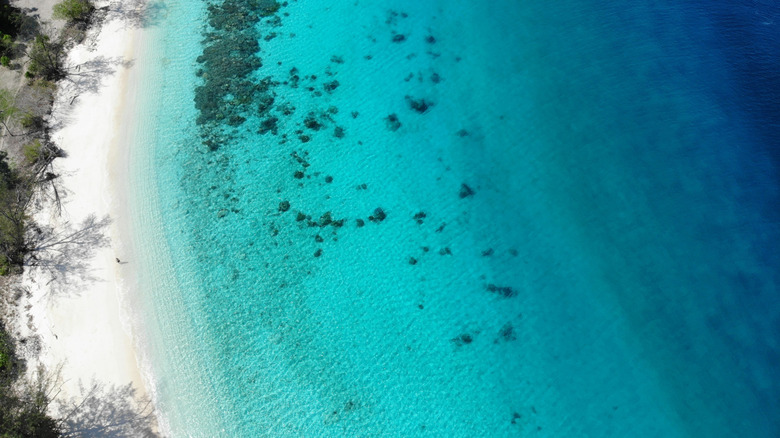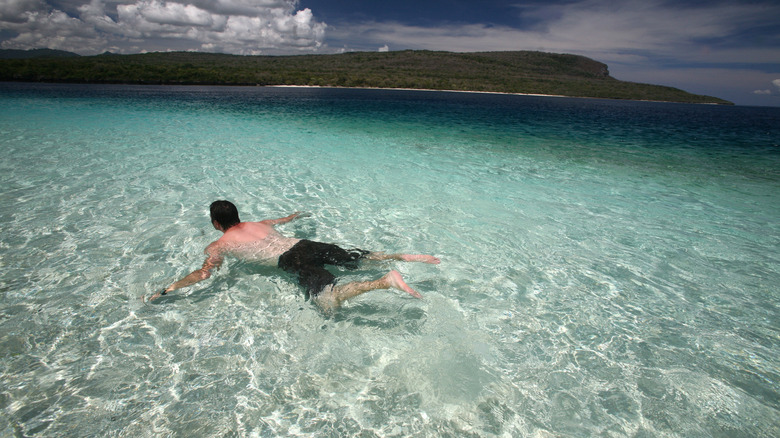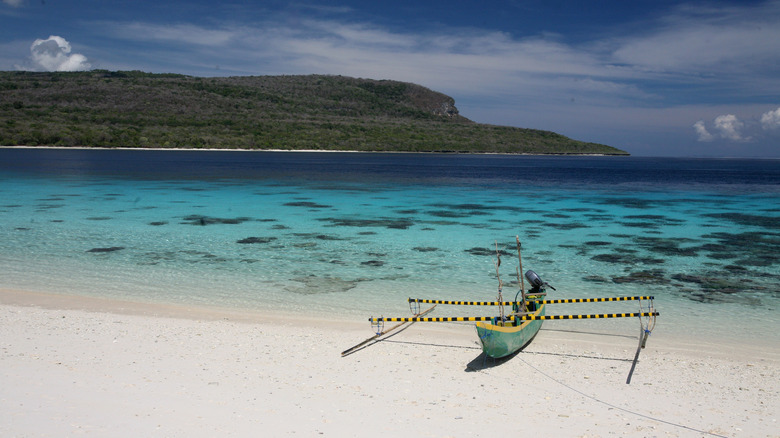A Deserted Tropical Island In Timor-Leste Boasts Hidden White Sand Beaches And Snorkeling
On Jaco Island, even the sea seems to whisper, "Don't tell too many people." A slice of paradise off the eastern tip of Timor-Leste, Jaco Island is a one-of-a-kind destination that's truly off the beaten path. Officially uninhabited and fiercely protected by local customs and laws, it has made a name for itself as one of the most untouched islands you can visit. With a CEOWorld Magazine report identifying Timor-Leste as one of the least-visited, most lesser-known countries in Asia — welcoming only 81,000 tourists in 2023 — it's possible that when you visit, you'll have the island to yourself.
Sacred to the Fataluku people, Jaco Island's isolation isn't accidental, as visiting during the day is permitted but staying overnight is considered taboo. Adding to this layer of protection, the island is also part of Timor-Leste's first and only national park, the Nino Konis Santana National Park, which could possibly become a UNESCO site in the next few years.
Its remote location makes it challenging to get to, as the island is located off the coast of Tutuala and far from the country's only international airport in Dili. But for those willing to make the journey, Jaco Island offers a unique reward. Expect a beach where footprints are few and far between and where you can admire the environment's raw beauty both above and beneath the lapping waves.
Step into the sacred tropical paradise of Jaco Island
At the far edge of Lautém District, just 660 yards from the mainland, Jaco Island is Timor-Leste's best-kept secret. Its sacred status has preserved its natural beauty, with the Fataluku people considering it the spiritual "head of the land." According to research from the book "Rethinking Cultural Resource Management in Southeast Asia," this gives the island a marked importance when contrasted with the rest of the country's islands, which make up "the body." This spiritual significance has led to strict cultural norms, including a longstanding prohibition of overnight stays to maintain the island's purity.
Alongside this cultural boundary, Jaco Island's status as a protected part of the country's only national park ensures that it remains pristine and untouched. Researchers from Udayana University note that the government purposely restricts development to preserve its ecological and cultural value. No buildings, no vendors, and no electricity can be found on the island, ensuring a uniquely serene experience for visitors who make the effort to reach it.
Swimming, exploring, and snorkeling are the best things to do on Jaco Island, as long as you're wary of the dangerous currents in the channel. Snorkeling around the coral reefs and saying hello to vibrant fish and other colorful marine life is an activity you shouldn't skip here. With no distractions and hardly another soul in sight, time on Jaco unfolds slowly — until your friendly local fisherman returns to ferry you back to the mainland and civilization.
Preparing for your trip to Jaco Island
The most challenging part of the trip to Jaco Island is actually getting there, but that adventure is half the experience. Most travelers fly into Dili, the capital, with connections from Malaysia, Indonesia, or Darwin, Australia. From there, it's a long nine-hour bus trip east to Lospalos, and visitors can expect rough roads along the way. After arriving in Lospalos, pickup trucks or shared taxis head to Tutuala, often very early in the morning. When you've finally made it to Tutuala, the last leg is a 5-mile walk to the beach, where locals are waiting to take you to Jaco Island. If this sounds daunting, there are also tour operators like Island Explorer Tours and Manny Timor Tours that take the stress out of the logistics by offering reliable transport as part of a multi-day itinerary.
When considering where to stay, there are only a few options along the beaches of Tutuala. There's the Valu Sere Beach Bungalows, which offers beachfront bungalows at $20 per night. Nearby, the Lakumorre Guesthouse offers more expensive accommodations ranging from $50 to $100 a night at the time of writing. There's also the option of local homestays, with some charging just $10 per person, often including breakfast and dinner. You won't see advertisements for these homestays, but it's possible to find them by asking around once you arrive in Tutuala.
When you're ready to take the $10 boat ride to Jaco Island, just ask your host or hotel staff to point you to the nearest local who can ferry you at your preferred time, as long as it's before 5 p.m. Since there are no services on Jaco Island itself, make sure to come fully prepared. Pack water, food, sunscreen, and yes, even your own snorkeling gear. It's a trek, no doubt, but once your feet hit Jaco's unspoiled sand, every mile is more than worth it.


